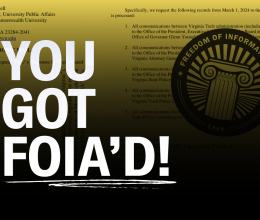Richmond, VA -- The ACLU of Virginia released the following statement by Executive Director Claire Guthrie Gastañaga commenting on today’s U.S. Supreme Court decision in Burwell v. Hobby Lobby:
Today, the U.S. Supreme Court dealt a major blow to Virginia women and all employees of closely held businesses (a substantial majority of all Virginia businesses).
The Court gave a green light to business owners who want to impose their personal religious beliefs on unwilling employees. In doing so, the Court flipped the fundamental American value of religious freedom on its head. Now, not only do owners of closely held businesses have the right to believe what they wish, they are entitled to impose those beliefs on their unwilling employees, regardless of the harm.
The Court’s ruling means that the religious beliefs of business owners, not medical science or decision-making, will guide what is included in employer sponsored health insurance. Despite the effort of the majority opinion to limit the decision to the provision of birth control, the Court’s holding will give business owners cover to refuse to offer insurance to cover other preventive health care (like blood transfusions or immunizations) if to do so would offend the owner’s beliefs.
To make matters worse, this decision will likely further embolden those who wish to use religion as a reason to discriminate in their businesses, their professional practices, and their companies. Not unlike those who used religion to defend slavery, to deny women the right to vote, and to oppose integration, there is a movement underway in Virginia to grant legal protections to service providers, businesses, and professionals who want to deny their services to LGBT Virginians. The Court clearly opens the door to such arguments by highlighting that the standard for judging whether such efforts are illegal will be whether a law prohibiting such discrimination is supported by a compelling governmental interest (generally only applicable to racial discrimination) and the prohibitions are “precisely tailored” to achieve that goal.
Today’s decision will only serve to fuel efforts to pass legislation that would grant businesses and state-licensed service providers additional licenses to discriminate and establish religious exceptions to otherwise neutral government laws prohibiting discrimination.
NEW
We won another case at the Supreme Court of Virginia!
